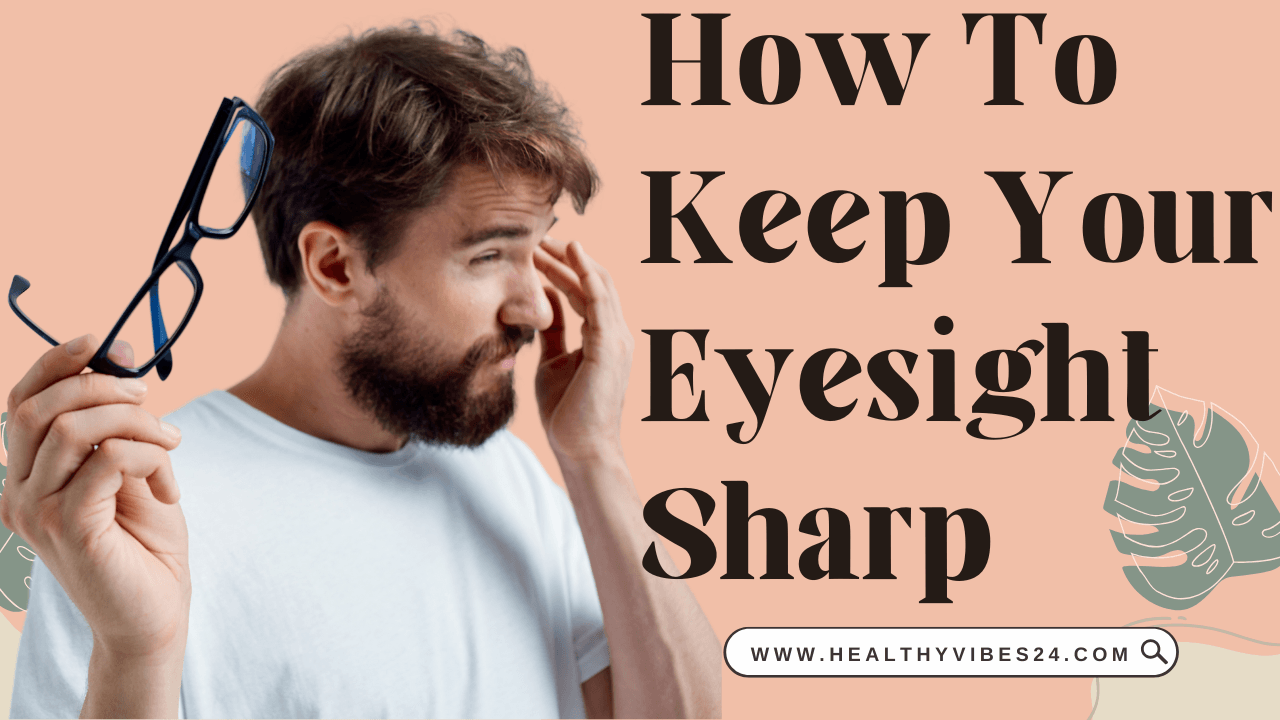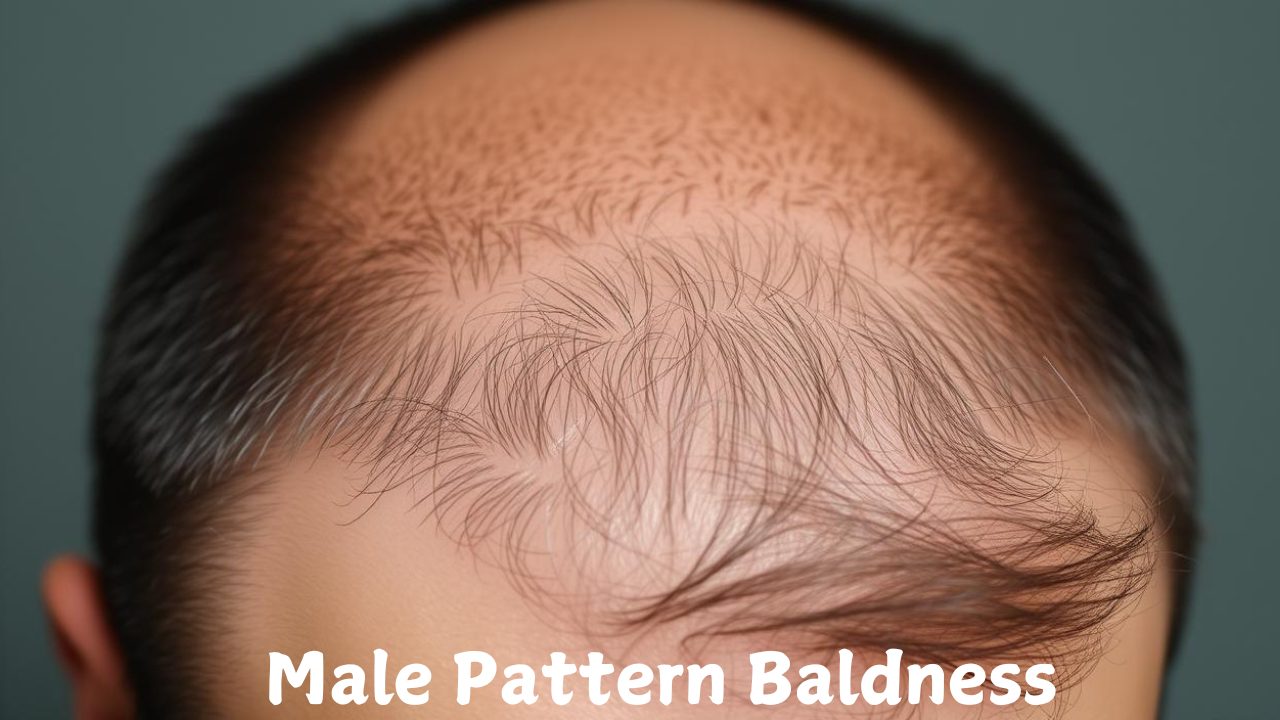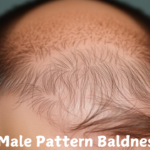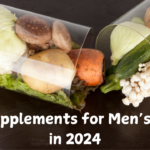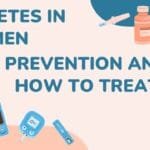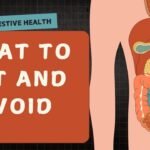Introduction:
Eye Health | As you are what you eat, have you ever considered how your eating habits impact on your eyes? As most of us are glued to the screens for several hours, the health of our eyes has never been this important before. Eye disorders have become so prevalent it is estimated that millions of people across the world suffer from it.
Thankfully, healthy diet has a lot to do with it and there is a myriad of foods that could be beneficial fro your eyesight. Besides, you will learn about useful nutrients and tasty foods for the eyes, meals, and concise life tips to improve eyesight here. At the end of the article, you should be able to create a plan that enhances proper nutrition for your eyes and the body.
1. Understanding Eye Health:
1.1 Common Eye Problems:
- Cataracts: Opacity of the lens, particularly associated with old people.
- Macular Degeneration: Severe degeneration in the foremost area of the retina which results in loss of vision.
- Diabetic Retinopathy: Neuropathy of the optic nerve: Diabetic retinopathy is characterized by the destruction of retinal small blood vessels.
Statistics:
- About 24 million persons 40 years and older in the United States have cataract.
- Macular degeneration is a widespread disease that occurred in 2.1 million people in the age group of 50 and above.
1.2 Importance of Nutrition in the Health of the Eye
It has been found that the eyes require different nutrients in order to provide you with proper vision. It is such a strategy that points to the need of adopting balanced diets so as to meet the vitamin and minerals requirement for treating eye complications. Selecting foods and meals depends on the nutritional impact of these choices on the risk and course of different eye illnesses.
2. Essential Nutrients for Eye Health:
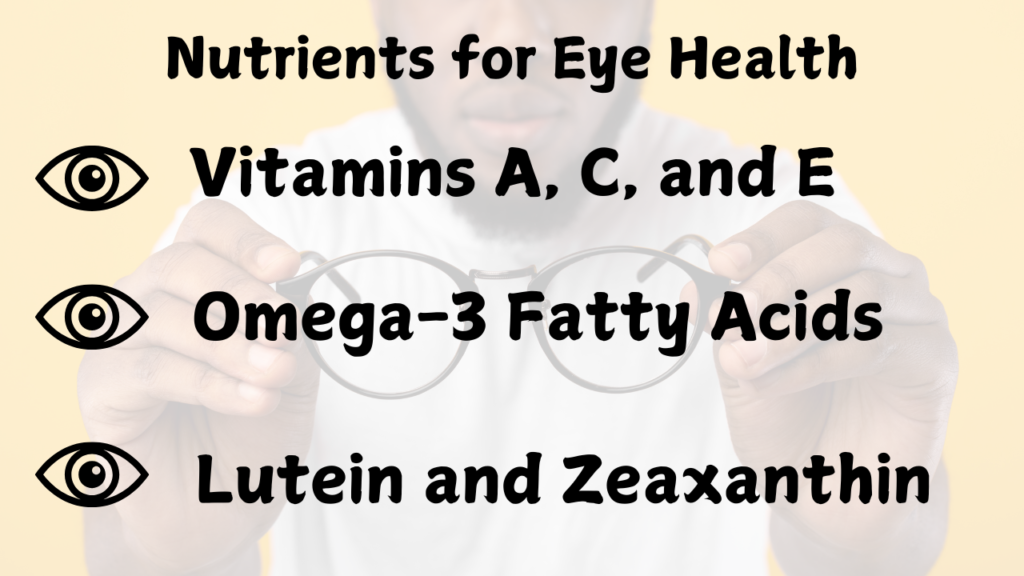
2.1 Vitamins A, C, and E
Vitamin A:
- Sources: Ralish, sweet batan, spinach.
- Benefits: Necessary for normal vision and highly recommended for use at night and during the evening.
Vitamin C:
- Sources: Oranges, lemons, limes, strawberries, bell pepper.
- Benefits: Against cataracts and for the eye.
Vitamin E:
- Sources: A piece of nuts and seeds at least ¼ cup and 2 cups of green leafy vegetables.
- Benefits: Is an antioxidant and helps shield the cells in the eyes from being destroyed.
2.2 Omega-3 Fatty Acids:
- Importance:
Required in maintaining healthy retinas and preventing the dry eye syndrome. - Sources:
Salmon, sardines, flaxseed, walnuts.
2.3 Lutein and Zeaxanthin:
- Explanation:
Such carotenoids screen out damaging high-energy blue light and assist in the protection and health of cells on the eyes. - Food Sources:
Spinach, kale, Corn, peas.
3. Healthy Dietary Patterns for Eye Health:
3.1 MedDiet:
Overview:
- A diet with increase in variety fresh fruits and vegetables, whole grain products and olive oil.
- Benefits for Eye Health:
Contains fats, proteins, vitamins A which the body needs to see and antioxidants that can help fight off eye ailments. - Key Foods to Include:
High fiber foods include whole grains, legumes, nuts, fish and many fruits and veggie.”
3.2 Antioxidants:
- Importance of Antioxidants:
Contributes to the protective effect against oxidative stress – the cause of many eye disorders. - Top Antioxidant Foods:
Berries, dark chocolate, and artichokes are some of the best food that may help to increase levels of this hormone.
3.3 Hydration and Eye Health:
- Importance of Hydration:
This is important to help the body maintain moisture in the eyes hence the importance of drinking lots of water. - Tips to Stay Hydrated:
- Carry a water bottle, increase the intake of high water content foods such as cucumbers watermelon, and use alarms for drinking water.
4. Practical Tips for Incorporating Eye-Healthy Foods:
4.1 Dietary Planning and Nutrients Digestion:
Plan Ahead:
Pen down a time in a week to sit down and prepare meals that contain foods that are good for the eyes.
Sample Meal Ideas:
- Breakfast: Oatmeal served with berry and nuts.
- Lunch: Spinach, oranges, grapefruits and kiwis topped with grilled salmon.
- Dinner: Quinoa with stir fried assorted vegetables and olive oil.
4.2 Reading Labels and Choosing Supplements
- Choosing Supplements:
If you can’t consume enough nutrients through your diet then it is wise to go for the good supplements. - What to Look For:
Products containing vitamins A, C, E and omega three fatty acids should be sought after.
5. Lifestyle Factors Affecting Eye Health:
5.1 Regular Eye Check-Ups:
- Importance of Routine Exams:
People using the smartphones at an older age are more susceptible to several eye disorders that can cause severe degree of vision loss, if not diagnosed in the early stages.
5.2 Limiting screen time and eye strain:
The results established that transforming participant demographics limited their screen time and eye strain.
Tips for Reducing Eye Strain:
- Follow the 20-20-20 rule: You should look at something at a distance of 20 feet every 20 minutes for 20 seconds at least.
- Tweak display settings to minimize on the glaring effect.
Conclusion:
A proper diet is the basic yet most important thing that you can do to keep your eyes healthy and vision clear. There is thus persuasive evidence that one could influence eye health through the right nutrients and right choices of food. From colorful fruits and vegetables to good fats, your dish can be a weapon against vision issues. Thus, careful and work to increase your eye health today and enjoy new advantages of a healthy and nutrient diet!

1. What foods are best for eye health?
The foods good for the eyes include those that has vitamins A, C and E, omega-3 fatty acids and antioxidants. Key options are:
Other vegetables (green leafs, kale, spinach).
Small portions of fish which are rich in fat which may include salmon or sardines.
Carrots and sweet potatoes
Oranges and lemon are the most popular types of citrus fruits.
Nuts and seeds
2. How does a healthy diet affect my eyesight?
Proper nutrition supplies micro nutrients that can also help reverse some of the conditions affecting the eyes. For instance, antioxidants play a role of shielding the eyes from oxidative damage and omega-3 Fatty acids have a role to play in the health of the retina.
3. Can supplements replace a healthy diet?
Supplements can complement the diet but ought never to be used to replace a proper diet. They contain balanced nutrients that complement other nutrients in building the body and hence are compulsory for the eyes.
4. How often should I have my eyes checked?
It is always recommended to also see an ophthalmologist periodically, especially with certain age and, of course, if you currently have vision issues. People are advised to have their eyes checked at least once to twice a year, but this can vary and you should consult an ophthalmologist about it.
5. Are there specific diets that promote eye health?
Of course, the Mediterranean diet is considered to be extremely effective for the vision. full of fruits, nuts, vegetables, whole grain products, and healthy fats which are all very beneficial to health and vision.
6. What is the 20-20-20 rule?
In our case, the 20-20-20 rule is a perfect technique of minimizing the effects of eye strain due to screens. And this is basically saying that each twenty minutes, one needs to look at an object that is 20 feet away for twenty seconds at least.
7. Can hydration really impact my eye health?
Absolutely! Drink water to keep the eye’s surface wet so that dryness and itchiness will not be a problem. Make sure to take a lot of fluids preferably water during the day.
8. What role do antioxidants play in eye health?
Antioxidants defend the eyes from other elements referred to as free radicals that may cause cataracts and macular degeneration. The sources of antioxidants are berries, dark chocolate and green leafy vegetables.
9. How can I easily incorporate eye-healthy foods into my meals?
Meal planning is key! Plan a weekly diet which contains as many eye-friendly nutrients as possible. It suggests simple recipes that include such components as greens, fatty fishes and colourful vegetables.
10. Are there any foods I should avoid for better eye health?
Many of these are unhealthy foods and should be avoided as they lead to the risk factors for obesity and diabetes which are enemies to good vision. It’s therefore important to take whole, nutrient-dense foods as a way of promoting healthier eyes.
